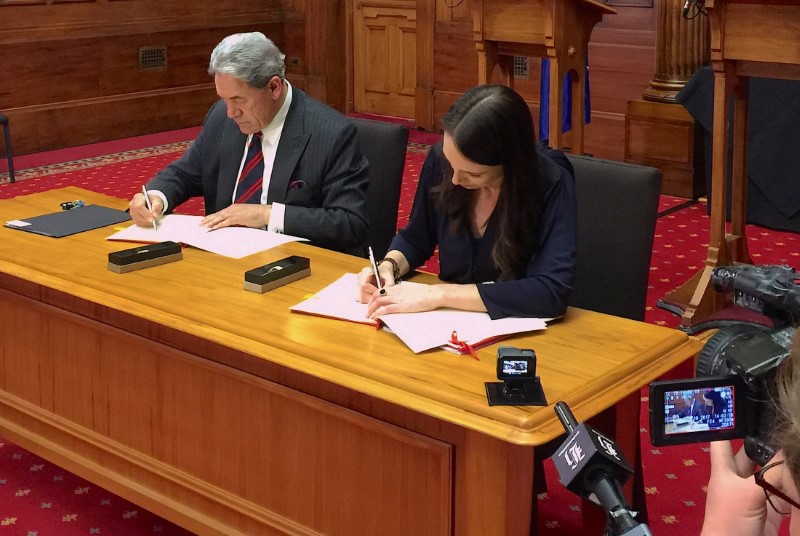By Jonathan Barrett and Ana Nicolaci da Costa
WELLINGTON (Reuters) - New Zealand's new government plans to review and reform the Central Bank Act to possibly include employment, alongside inflation, as a dual target, Labour Prime Minister-elect Jacinda Ardern said on Tuesday.
The populist New Zealand First, the junior partner in the new Labour-led coalition government, also wants to broaden the central bank's focus to include greater management of the local dollar's value against other currencies.
"We have been looking at changing the objectives set out in the Reserve Bank Act," Ardern told reporters in Wellington.
"The objectives of the Act to possibly include employment is certainly part of our plans."
Labour flagged the monetary policy changes during its election campaign. New Zealand First has previously mentioned it would like the central bank to better manage the currency, without elaborating.
The New Zealand dollar suffered fresh falls on Tuesday as Ardern and New Zealand First leader Winston Peters confirmed their policy priorities. The kiwi dollar
Rather than just focussing on inflation, Labour wants the Reserve Bank to have a full employment goal when devising policy settings, bringing it into line with the United States and Australia.
While unemployment in New Zealand is at near decade lows of below 5 percent, job growth was a hot political issue during the recent election.
NEW FOREIGN MINISTER
The unlikely alliance between the centre-left Labour and populist New Zealand First was brokered after a Sept. 23 election failed to deliver a majority to the governing National or opposition Labour.
Peters has been offered the role of deputy prime minister, which he is likely to accept, and Ardern indicated on Tuesday that Peters would also become foreign minister, putting a protectionist at the forefront of New Zealand's international relations.
Peters was foreign minister in a Labour-led government in 2005, during which time he became among a handful of Western politicians to visit North Korea.
"The general consensus is that he did a good job," said Richard Shaw, politics professor at Massey University.
"He wasn't particularly interested in restructuring departments. He's very good at working the room and is an affable character."
Labour and New Zealand First share similar policies designed to cut immigration, ban foreigners from buying existing property and raise the minimum wage.
Many of the policies draw on voter concerns that immigration and foreign buyers of local homes are putting too much pressure on infrastructure and house prices, representing a shift in New Zealand's formerly open door policy.
Ardern said Labour's immigration policy remained in place, whereby net migration would reduce from by between 20,000 to 30,000. This represents a less dramatic cut than New Zealand First had proposed prior to the election. Net migration is running at just over 70,000 a year.

While a "confidence and supply" agreement with the Greens is delivering policies across the political spectrum, such as a push to legalise cannabis for personal use.